Serviços Personalizados
Artigo
Indicadores
Links relacionados
-
 Citado por Google
Citado por Google -
 Similares em Google
Similares em Google
Compartilhar
South African Journal of Occupational Therapy
versão On-line ISSN 2310-3833
versão impressa ISSN 0038-2337
S. Afr. j. occup. ther. vol.43 no.1 Pretoria Abr. 2013
SCIENTIFIC ARTICLES
Matriculation scores as an indicator of academic success in an occupational therapy education programme
Pragashnie NaidooI; Nasreen MotalaII; Robin Wendy Elizabeth JoubertIII
IB.OT (UDW); MOT (UKZN); CAMAG Senior Tutor, Discipline of Occupational Therapy, School of Audiology, Occupational Therapy & Speech-language Pathology, Faculty of Health Sciences , University of Kwa-Zulu Natal
IIB.OT (UKZN); LLB (Med.Law) (UKZN) Private Practitioner
IIID.Ed (UKZN) Associate Professor, Academic Leader: Discipline of Occupational Therapy, School of Audiology, Occupational Therapy & Speech-language Pathology, Faculty of Health Sciences, University of Kwa-Zulu Natal
ABSTRACT
Over the past two decades there has been little change in the entry requirements for undergraduate studies at the South African universities. A particular difficulty in the selection of health sciences students by the universities in South Africa is the ability to predict success, as a substantial amount of knowledge, abilities, and skills are required by the health sciences professions of their graduates. Notwithstanding this, there is evidence to both support and refute pre-admission academic grades as reliable predictors of academic success.
The aim of this study was to investigate whether matriculation points (grade point average) could be used as a predictor to determine successful completion of the Bachelor of Occupational Therapy (BOccTh) degree at the University of KwaZulu Natal.
A retrospective review of the records of 103 BOccTh student who entered the course between 2005 and 2010 was conducted. Analysis of the year of entry, year of graduation, matriculation point average, number of years taken to complete the degree and degree averages was carried out.
It was found that graduates with lower matriculation scores took longer to complete their degrees than those with higher matriculation scores. Graduates with higher matriculation scores had a higher degree average. The results suggest that matriculation scores may be used as a predictor of degree averages; however the authors view this finding with caution due to various confounding factors.
INTRODUCTION
Scope of the Study
The focus of this study was to determine whether matriculation scores would be a reliable predictor of academic success in an occupational therapy (OT) undergraduate programme. Academic success, as defined by the authors in this context, constitutes minimum time taken to complete the degree (4 years) and degree averages attained. The cohort of students in this study was not a product of the National Senior Certificate (NSC) system which was only formally implemented in South Africa in 2008.
LITERATURE REVIEW
The selection of health sciences students by the universities in South Africa, continues to be a complex and difficult process. This is partly because success in completing the degree requires students to acquire a substantial amount of knowledge, abilities and skills, as well as because of the relatively high academic standards in each professional degree. This appears to be further complicated by the need to provide a reliable and equitable method of addressing issues of redress.
Due to the increasing number of candidates competing for a place within an academic programme, selectors are bound not only by strict admission criteria and quota systems but also need to document criteria by which student selection decisions are made. As assistants in the selection process, it is our responsibility, to execute an efficient and fair process in identifying candidates who will complete the degree programme and exit to become successful therapists1.
Over the past two decades there has been little change in the entry requirements for undergraduate studies at the South African universities2. The growing demand and competition for places to study occupational therapy at Universities in South Africa requires a selection process that is as meticulous as possible in assuring objectivity and fairness, whilst simultaneously ensuring that the right person with the adequate potential to both complete the degree and to become a competent occupational therapist, is slecetd.
Finding a tool that will adequately identify the multiple facets which contribute towards a competent occupational therapist is a virtual impossibility because there are so many competencies which are required for practice. Notwithstanding this, the selection process should, at least ensure that the graduate completes the educational programme possessing the knowledge and range of competencies that will lead to good practice3.
Fraser and Killen2 refer to 'pre-enrolment' predictors such as matriculation scores and 'post-enrolment' predictors which are those that are required to sustain and maintain the ability to complete the degrees for which students register such as motivation and self discipline. They mention that there is an assumption that students who meet the entry requirements for undergraduate study and have above-average matriculation scores will succeed in their respective chosen course of study2. Thus, in selecting students for the occupational therapy degrees, the selectors have to seek generic pre-enrolment indicators that will provide a reasonable indication of the student's potential to complete the degree within the given time frame, with an acceptable academic record, and who will also graduate possessing at least some the desirable personality traits and appropriate attitudes.
While there appears to be some evidence to indicate that pre-enrolment or grade point average (GPA) scores are a valid predictor of academic success1,4, there is also evidence, especially in professions such as occupational therapy and nursing, that this is not necessarily always the case1,5. In spite of the evidence to support the fact that pre-admission academic grades are reliable predictors of subsequent in-course performance across disciplines4 there is also evidence of numerous other factors which may influence academic success during the post-admission period. This includes how the student interacts with the university's academic and social systems2. Killen6 suggests that the predictive validity of entry examinations or school leaving examinations is problematic because other factors may come into play after a student enrols at university and this can affect his or her performance either positively or negatively. The importance placed on academic performance is flawed, because academic ability is only one attribute contributing to the success of the applicant, especially in a health science related field7.
The Senior Certificate school leaving examination in South Africa is one of the most important measures of academic merit for selection into tertiary education8. The Senior Certificate Examination is a six or seven subject examination which is taken at either Higher Grade or Standard Grade. A standard grade score is then converted to a higher grade equivalent. An average of the candidate's subject scores are then calculated to obtain the matriculation score8.
In the South African context, the apartheid inheritance and a slow process of restitution cannot be ignored. Preparations for the senior certificate examination differ markedly amongst various schools depending on the level and quality of education in those schools and the resources available. Thus the school attended may advantage or disadvantage certain candidates. Herman8 postulates that the emphasis on the matriculation examination seems unfair in a divided society, due to the previous schooling system which privileged certain racial groups. Our country is yet to recover from the damages of the previous apartheid legacy; inequalities, redress, compensation and correction are still being implemented. In light of that applicants experience different qualities of school education, competing on an "equal footing", places some applicants at a disadvantage.
What is it then that constitutes academic success? According to Killan6, academic success in the context of undergraduate study refers to students who are able to comply with the entry requirements of the particular programme for which they are applying and to complete the course within the minimum stipulated time frame6.
Thus the aim of this study was to determine if the aggregate grade 12 summative examination mark (viz. matriculation score), reliably predicts a students ability to pass the Occupational Therapy programme at the University of KwaZulu-Natal in the minimum time.
The following objectives were formulated:
⥠To evaluate if there is a correlation between matriculation scores and number of years taken to complete the occupational therapy degree,
⥠To establish if there is a correlation between occupational therapy degree averages of students who enter with high matriculation scores compared with those who enter with lower scores and,
⥠To establish if there is a correlation between matriculation scores and marks attained in combined theory and clinical modules within the occupational therapy degree programme.
METHODS
Study Design
The research design used in this study was a descriptive retrospective record review.
Population and sample
A purposive sample of all academic records of students completing the Bachelor of Occupational Therapy programme within the Faculty of Health Sciences at the University of KwaZulu-Natal (UKZN), between 2005-2010 was examined. On average, 25 students per year are admitted to the degree programme at UKZN. Due to students dropping out for various reasons the final sample consisted of 103 students who completed the degree.
Research Procedure
All the academic records of the students who completed the degree in the above time period were accessed from the Division of Management Information at the UKZN and reviewed.
The following data were collected for analysis: year of entry into the occupational therapy programme; year of graduation; matriculation points; years taken to complete degree (calculated as the difference between the year of first registration and the graduation year); degree averages; and the marks of eight combined theory and clinical modules across the four years of study.
The data were analysed using Excel 7 and the Social and Statistical Package for Social Scientists, (SPSS), version 15.
Ethical clearance from the relevant university structures was obtained (FECHSC 003/11).
RESULTS
Number of graduates between 2005-2010 and the Year of First Registration
Table I provides the number of students that graduated over each year over the the six year period from 2005-2010. This data was used to compute the number of years that students had taken to complete the four-year degree.
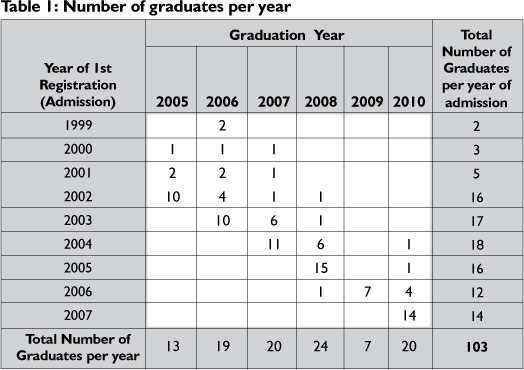
Graduates per year and Time taken to complete degree (2005-2010)
Graduates took an average of four to five years to complete the four-year occupational therapy degree. The 2006 graduates took an average of six years to complete while 2009 graduates completed in four years (see Graph 1).
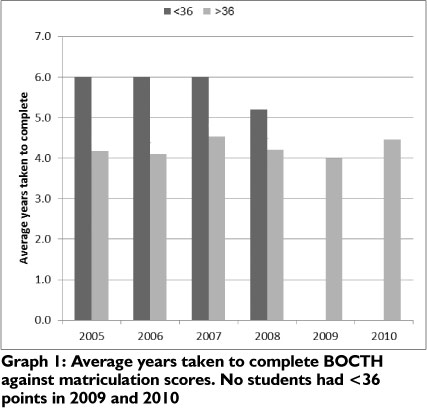
Average number of years taken to graduate by matriculation points
Table II shows that graduates with lower matriculation scores took longer to complete their degrees than those with higher matriculation scores, for example in 2005, six students with 30 matriculation points graduated. Sixty seven students out of 103 (65%) in the period under discussion completed their degrees in the minimum prescribed period.
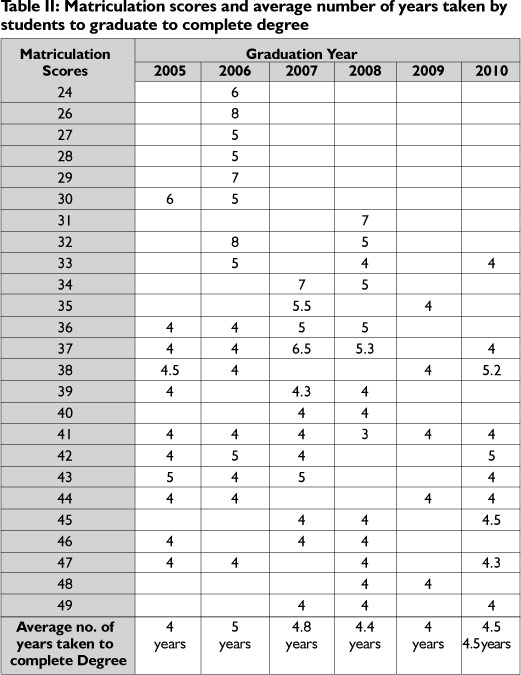
These results are shown to be statistically significant with a significant moderate correlation between matriculation scores and number of years taken to complete the degree, at the 99% level. Graduates with lower matriculation scores took longer to complete the degree.
Spearman's rho correlation was computed to determine if there was a significant relationship between the two variables, i.e. for years taken to complete the degree and matriculation scores. Spearman's rho correlation was used over Pearson r, since the variables did not follow a normal distribution. The results indicated that matriculation scores are not a reliable predictor of years taken to complete the degree.
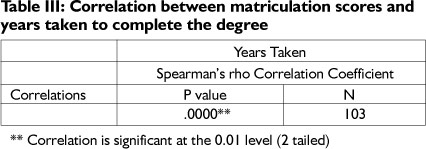
Degree Averages
Degree averages ranged between 62.4% and 72.6%. An overall improvement in degree averages from 2006 to 2009 was noted (See Graph 2).

A significantly high correlation between matriculation scores and degree averages at the 99% level was found (see Table IV). Graduates with higher matriculation scores had a higher degree average.

Clinical Averages
Further correlation studies to determine whether matriculation scores were a good predictor of clinical success as measured by eight occupational therapy combined theory and clinical modules were also computed. However, matric points were found to not be a reliable predictor for performance in these modules as the correlation is only significant at the <0.01 level. From these findings none of the p values were close to 0.01 as can be seen from the Table V. Hence, matriculation scores appeared not to be a reliable predictor for performance in clinical modules, suggesting that matriculation scores are not a good predictor of clinical competence.
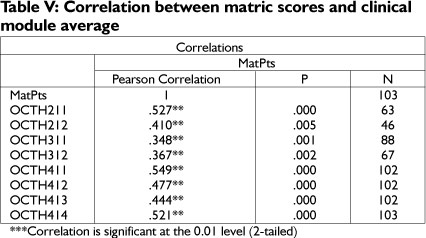
DISCUSSION
A total of 103 occupational therapy students graduated over the period 2005-2010 with graduates taking four to five years to complete the stipulated four-year occupational therapy degree. Of the 103, 65% of the graduates completed the course in the minimum time i.e. four years. Those who graduated between 2006 and 2007 took an average of five years to complete while 2005 and 2009 graduates completed in four years. Graduates with lower matriculation scores took longer to complete their degrees than those with higher matriculation scores (Tables II and III).
Degree averages ranged between 62.4% and 72.6%, thus an overall improvement in degree averages from 2006 to 2009 was noted (see Graph 2).
It is difficult to provide a strong argument or reasons for the diversity over these years. Factors that may have however influenced the overall performance of students include curriculum reviews and changes taking place at the time, modifications in assessment methods, introduction of academic development tutors, introduction and implementation of an exclusion policy, exodus of staff and entry of a number of newly appointed academics, inter alia, in the context of the health science faculty at UKZN in this period. Investigation into these factors was beyond the scope of this study. There is evidence in the literature to suggest that psy-chosocial factors, teaching methodologies, students' motivation, the interaction between students and the academic staff and the social systems within the university as well as the students' study methods and approach to studying, are all likely to influence the student's success at university1.
A significantly high correlation between matriculation scores and degree averages at the 99% level was found (Table IV). Graduates with higher matriculation scores obtained a higher degree average. These results indicate that matriculation scores may be used as a predictor of degree average.
Herman8 states that school leaving exams worldwide are the most significant admission criteria for higher education studies. Although Fraser and Killen2 argue that there is limited evidence of the predictive validity of the matriculation results in the South African context, the exam is externally moderated and uniform which gives it greater credibility. Other South African studies1,9-11 and previous American studies12,13 substantiated our results and highlighted the fact that pre admission grade scores on admission seem to predicted final degree results.
This finding is however contrary to Howard and Jerosch-Herold5 who found that there was a weak positive correlation between entry score and final degree scores for a group of physiotherapy and occupational therapy students at the University of East Anglia (UEA). Kerr14 found that more than 50% of performance within a health science degree was not accounted for by pre-entry factors.
Whilst both academic and clinical scores make up the degree averages, it can be argued that computing module averages is not the most accurate reflection of a student's overall ability. Additional correlations to determine if matriculation scores were a good predictor of clinical success as measured by eight occupational therapy combined theory and clinical modules were also computed. Results however indicated that matriculation scores did not seem to be a good predictor of such success.
The authors acknowledge that the use of academic scores as a sole predictor for admission into occupational therapy degrees is problematic in the context of this study. The reason for this is that it may result in the exclusion of students from disadvantaged educational backgrounds3 who would make good therapists and those who may be academically competent and who would otherwise score higher on some of the other desirable predictors. For these reasons, the researchers do not support the use of academic scores as a sole predictor of success not only as students within the academic programme but as occupational therapists in the future. Rather, a combination of predictors should be utilised in an effort to increase the potential for multiple correlations with that of criterion performance.
LIMITATIONS OF THIS STUDY
Within the limits of this study, factors other than matriculation averages that could impact on the time taken to complete the degree for certain cohorts were not investigated. Attrition of students was also not factored into this study. Additionally, the findings of this study do not necessarily apply to all students within occupational therapy programmes nationally or internationally as specific factors inherent within the degree programmes differ to a greater or lesser degree. Caution must therefore be exercised when generalising these results.
CONCLUSION
There is general agreement in current research and approaches to selection of health sciences students, that selection on the basis of academic performance alone is flawed. Academic or intellectual ability, irrespective of how it is measured is said to be only one advantageous outcome7. Whilst the results of this study, in the scholastic system within the stipulated period, indicate that matriculation scores are indeed a good predictor of degree averages, for reasons already discussed in this paper, this may not necessarily be suggestive that they are a good predictor of a good clinician.
The profession of occupational therapy is one that is complex and multifaceted, necessitating a training that is rigorous, full and demanding and thus further necessitating some form of pre-entry assessment of academic ability that will evaluate the attributes necessary to equip a student to be successful in completing the training for such this career. There has been a debate in previous years about what constitutes minimum academic pre-requisites and how these may be measured. Traditionally at the UKZN, the discipline of occupational therapy has utilised a combination of matriculation scores and interviews to determine suitable candidates for the programme. The authors in this article have attempted to demonstrate the link between matriculation scores and academic success in a four-year occupational therapy programme. However, while this research produces similar findings to related research regarding the link between matriculation scores and predictability of success at University, we continue to stress our belief that selection requires more than simply basing acceptance into degrees upon academic merit. Thus future research should attempt at determining the other essential characteristics that should also form part of the selection process.
We suggest that just as the academic programme and curriculum require evaluation, selection processes and methods must be constantly evaluated to determine their validity.
Acknowledgements
The authors would like to thank Ms I. Naidoo, principal information analyst, Management Information, University of KwaZulu-Natal.
REFERENCES
1. Balogun, J. Predictors of Academic and Clinical Performance in a Baccalaureate Physical Therapy Program. Physical Therapy. É998;68(2);238-42. [ Links ]
2. Fraser, W.J., Killen, R. Factors influencing academic success or failure of first-year and senior university students: do education and lecturers perceive things differently? South African Journal of Education. 2003;23(4):254-60 [ Links ]
3. Lyons, M. Mackenzie, L. Bore, M., Powis, D. Framing a set of non-academic selection criteria for occupational therapy students: An Australian study. Australian Occupational Therapy Journal. 2006;53:284-92 [ Links ]
4. Salvatori, P Reliability and Validity of Admissions Tools Used to Select Students for the Health Professions. Advances in Health Sciences Education. 2001;6:159-75. [ Links ]
5. Howard, L. Jerosch-Herold, C. Can Entry Qualifications be Used to Predict Fieldwork Outcomes in Occupational Therapy and Physiotherapy Students? The British Journal of Occupational Therapy. 2000;63(7):329-34. [ Links ]
6. Killen, R. Difference between student's and lecturer's perceptions of factors influencing students' academic success at university. Higher Education Research and Development. 2002;13:199-212. [ Links ]
7. Searle, J. McHarg, J. Selection for medical school: just pick the right students and the rest is easy. Medical Education. 2003;37:458-63. [ Links ]
8. Herman, H.D. School-leaving Examinations, Selection and Equity in Higher Education in South Africa. Comparative Education. É995;3É(2):26É-74. [ Links ]
9. Balogun, J.A., Karacoloff, L.A., Farina, N.T. Predictors of academic achievement in physical therapy. Physical Therapy. 1986;66:976-80. [ Links ]
É0. Behr, A.L. The senior certificate examination as a predictor of university success. South African Journal of Education. 1985;5:107-12. [ Links ]
ÉÉ. Jawitz, J. Performance in first and second year engineering at UCT. South African Journal of Higher Education. 1985;9:101-8. [ Links ]
12. Scott, A.H., Chase, L.M. Lefkowitz, R., Morton-Rias, D., Chambers, C. Joe, J., et al. A national survey of admissions criteria and processes in selected allied health professions. Journal of Allied Health. l995;Spring:95-l07. [ Links ]
13. Kirchner, G.L., Holm, M.B. Prediction of academic and clinical performance of occupational therapy students in an entry level master's programme. American Journal of Occupational Therapy. 1997;5I(9):775-9. [ Links ]
14. Kerr, K. Pre-entry requirements and academic performance in primary degree courses in physiotherapy at the Ulster Polytechnic. Physiotherapy. 1985;7I(II):468-72. [ Links ]
15. Mills, C., Heyworth, J., Rosenwax, L., Carr, S. Rosenberg, M. Factors associated with the academic success of first year Health Science students. Advances in Health Science Education. 2009;14:205-7. [ Links ]
 Correspondence:
Correspondence:
Pragashnie Naidoo
Naidoopg@ukzn.ac.za














